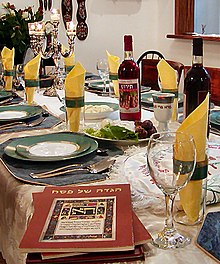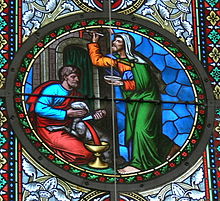Passover
Passover, also called Passa, Passover or Pascha (Hebrew פֶּסַח pésach, ![]() ; Aramaic פַּסְחָא pas'cha; (Septuagint and NT:) Greek πάσχα pás'cha, German 'to pass over'), is among the most important festivals of Judaism. The festival commemorates the exodus from Egypt (Exodus), that is, the liberation of the Israelites from slavery, recounted in the 2nd Book of Moses in the Tanakh. The retelling (Haggadah) of this event connects each new generation of Jews with their central experience of liberation.
; Aramaic פַּסְחָא pas'cha; (Septuagint and NT:) Greek πάσχα pás'cha, German 'to pass over'), is among the most important festivals of Judaism. The festival commemorates the exodus from Egypt (Exodus), that is, the liberation of the Israelites from slavery, recounted in the 2nd Book of Moses in the Tanakh. The retelling (Haggadah) of this event connects each new generation of Jews with their central experience of liberation.
Passover is celebrated by Jews during the week of Nisan 15-22, in Israel until Nisan 21. It is a family festival with various rites, which is introduced with the Seder evening on the 14th of Nisan and is accompanied by a week-long eating of matzos, which is why it is also called the "Feast of Unleavened Bread".
In the time of the Second Temple in Jerusalem, i.e. between about 530 B.C. and 70 A.D., Passover was one of the three Israelite pilgrimage festivals, along with Shavuot (the Feast of Weeks) and Sukkot (the Feast of Tabernacles), on which the faithful made a pilgrimage to the Temple Mount.

Seder table with Haggadah books
Term
The Hebrew word פסח pessach is derived from a verbal stem meaning "to push up/against/back" or "to bounce off." It denotes in Ex 12:13 EU the "passing," "skipping," or "leaping over" of Jewish homes during YHWH's punitive judgment of the Egyptian male firstborn on the night of the Exodus. The Hebrews were spared because they had marked their doors with a protective sign (Ex 12:27 EU).
The most common forms of the name used in German by non-Jews or Christians are Passa (Luther Bible, Protestant liturgy), Pascha (pronounced as Pas'cha, Loccumer Richtlinien, Einheitsübersetzung, Catholic liturgy). The revised Einheitsübersetzung of 2016 uses the spelling Pessach in the Old Testament.
Pascha in the Vulgate is a loanword from Greek. With word derivations from the Latin pascha most European languages designate the Christian Easter (see there).
Biblical rationale
The Passover is inserted in Ex 12:1-20 EU as God's commandment between the announcement (Ex 11:5-10 EU) and the execution (Ex 12:29-51 EU) of the last of the Ten Plagues. Some later provisions supplement Ex 12:43-49 EU.
In the biblical context, this feast ends Israel's bondage: when the Egyptians refuse to let the Hebrews go, God announces to them, after nine unsuccessful plagues, the killing of the firstborn of man and beast. To be spared, each Israelite family was to slaughter in the evening a male, one year old, without defect, young of sheep or goat, brush the doorposts with its blood, and then roast it and eat it together whole. At the houses thus marked the angel of death would pass that same night (Exodus 12:23 EU) (pāsaḥ), while executing God's punitive action on Egypt. Pharaoh then urges the Israelites to leave the land, for which they are prepared according to God's instructions.
In addition to the slaughter and consumption of the Passover animals, the chapter also establishes the date of the feast, hyssop for painting the doors, the sweeping out of all leavened dough, the seven-day eating of matzah, the girded, clothed vigil of Exodus night, and gatherings on the first and last feast days. Ex 13:1-16 EU adds the sacrifice (animal) or consecration (human) of the male firstborn and the narrative recollection of Exodus night in response to a son's question about the origin and meaning of Passover.
Provisions from the later royal period in Dt 16:1-8 EU commanded the Passover as the central cult festival and forbade home slaughter. Cattle could also be chosen as sacrificial animals; they had to be cooked on the same evening and consumed completely. The seven-day matzo meal was to be accompanied by the sweeping out of all leaven from Israel during the festival week, "that you may remember all your life the day on which you came out of Egypt" (V. 3). The seventh feast day was to be observed as a day of rest with an assembly.
Num 9:1-14 EU repeats the Passover rules of Ex 12 EU and adds: Whoever is prevented from participating for any reason - such as a long journey or a cultic impurity - may celebrate Passover in the following month (on the 14th of Iyar) (Pesach scheni: "second Passover", also called "small Passover"). The second Passover lasts only one day, and the prohibition against leavening does not apply. Nevertheless, matzos, among other things, are eaten in remembrance on this day as well.
Jos 5,10-12 EU describes a Passover of the second desert generation at the transition to settling down in Canaan. Thereby God had finally removed the "Egyptian shame" from the Israelites; from that feast on the manna as miraculous desert food was no longer necessary.

Sacrifice of the Lamb during the Plagues (1880), Parish Church of Andelsbuch (Vorarlberg)
Search within the encyclopedia